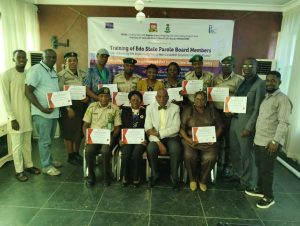Prison Congestion: PRAWA Trains Edo Parole Board on Non-Custodial Measures

The Prisoners Rehabilitation and Welfare Action (PRAWA) has conducted a two-day capacity-building training for members of the Edo State Parole Board on effective implementation of non-custodial measures.
The training, held in Benin City and concluded on Thursday, was organized in collaboration with the Nigerian Correctional Service (NCoS) and supported by the Rule of Law and Anti-Corruption (RoLAC) Programme. RoLAC is funded by the European Union and implemented by the International Institute for Democracy and Electoral Assistance (International IDEA).
John Ogundele, Programme Officer at PRAWA, said the initiative was aimed at addressing the persistent congestion in Nigeria’s correctional facilities.
“Nigeria currently has over 81,000 inmates in custodial centres across the country, with 70 percent of them awaiting trial,” Ogundele noted. “This situation is largely due to the underutilisation of non-custodial sentencing options such as parole.”
He explained that the training was designed to build the capacity of the Edo Parole Board to implement parole more effectively and to promote collaboration among key stakeholders including the correctional service, judiciary, National Directorate of Employment, and civil society organisations.
Ogundele expressed confidence that increased adoption of non-custodial measures would not only ease prison congestion but also foster public trust in the justice system and enhance rehabilitation opportunities for offenders.
“The goal is not just to reduce the prison population but to ensure that offenders are properly reintegrated into society as responsible citizens,” he added.
In her remarks, Hon. Justice A. Edodo-Eruaga (Rtd), Chairperson of the Edo State Parole Board, described the training as a guide for board members to administer parole fairly and consistently.
“This shift from over-reliance on custodial sentences to thoughtful application of non-custodial measures is essential in building a more effective and humane justice system,” she said.
Also speaking, Imonitie Omokhodion, a representative of RoLAC, said the programme’s focus is to strengthen the criminal justice system through alternatives to imprisonment.
“Our aim is to support a functional parole board that can rehabilitate qualified inmates and help them reintegrate successfully into society,” he said.
The Controller of Corrections, Edo Command, Sunny Oyakhire, represented by Ogbue Agiliga, pledged the command’s full support for the implementation of parole.
“We are committed to providing the necessary support to ensure the success of non-custodial measures,” he stated.
Lead training facilitator, Justice Obisike Oji (Rtd), emphasised the importance of fairness and objectivity in the implementation of parole.
“This training is a crucial step in addressing prison overcrowding, enhancing rehabilitation, and reducing recidivism,” he said. “Parole board members must approach their duties with diligence and justice.”
============
